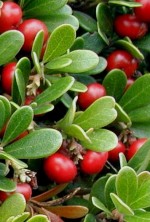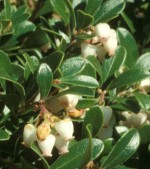 Bearberry is a low growing, fine textured evergreen shrub that is native to northern parts of Europe, Asia and North America. It is a member of the heath family, Ericaceae, that also includes blueberry, azalea, and heather. The plants grow up to 12” tall and slowly form dense, creeping mat of prostrate red stems carrying leathery, dark green, tear-shaped leaves about 1″ long, sometimes with a bronze or reddish tinge by fall. In spring, terminal clusters of tiny, pendent, bell-shaped white to pink flowers appear that are followed by 1/2″ wide berries that are green maturing to bright red by fall. Bearberry thrives in poor sandy soil and is particularly useful as a ground cover especially in seaside gardens because it tolerates salt and drought. It is beautiful cascading down a wall. Leaves and berries are used for Christmas decorations. Bearberry is difficult to establish and prefers cool climates. The genus name, Arctostaphylos, comes from the Greek words ἄρκτος (arcto), meaning bear, and σταφυλή (staphyle), meaning bunch of grapes, and refers to grape-like clusters of fruit produced by the plant. The specific epithet, uva-ursi, comes from the Latin words uva, meaning grape, and ursus, meaning bear, referring to the fact that bears eat the fruits.
Bearberry is a low growing, fine textured evergreen shrub that is native to northern parts of Europe, Asia and North America. It is a member of the heath family, Ericaceae, that also includes blueberry, azalea, and heather. The plants grow up to 12” tall and slowly form dense, creeping mat of prostrate red stems carrying leathery, dark green, tear-shaped leaves about 1″ long, sometimes with a bronze or reddish tinge by fall. In spring, terminal clusters of tiny, pendent, bell-shaped white to pink flowers appear that are followed by 1/2″ wide berries that are green maturing to bright red by fall. Bearberry thrives in poor sandy soil and is particularly useful as a ground cover especially in seaside gardens because it tolerates salt and drought. It is beautiful cascading down a wall. Leaves and berries are used for Christmas decorations. Bearberry is difficult to establish and prefers cool climates. The genus name, Arctostaphylos, comes from the Greek words ἄρκτος (arcto), meaning bear, and σταφυλή (staphyle), meaning bunch of grapes, and refers to grape-like clusters of fruit produced by the plant. The specific epithet, uva-ursi, comes from the Latin words uva, meaning grape, and ursus, meaning bear, referring to the fact that bears eat the fruits.
 Type: Evergreen prostate shrub
Type: Evergreen prostate shrub
Outstanding Feature: Red berries from late summer into fall; salt and drought tolerance
Form: Low growing dense mat
Growth Rate: Slow
Bloom: Tiny white to pink bell-shaped flowers are produced in racemes in spring.
Size: 6-12” H x 15’
Light: Full sun; tolerates some shade
Soil: Infertile, sandy, dry to moderately moist, well-drained, slightly acidic
Hardiness: Zones 2-7
Care: Low maintenance; no need to prune
Pests and Diseases: Generally disease resistant but may be susceptible to mildew, rust, leaf spot and leaf gall.
Propagation: Stem cuttings; seed (needs stratification and scarification)
Outstanding Selections:

-
- ‘Massachusetts’ (more disease resistant with smaller leaves than species; flowers and fruits well)

-
- ‘Point Reyes’ (heat and drought tolerant)

- ‘Vancouver Jade’ (outstanding vigor, larger leaves than species).
- Photo Credits: Wikipedia
